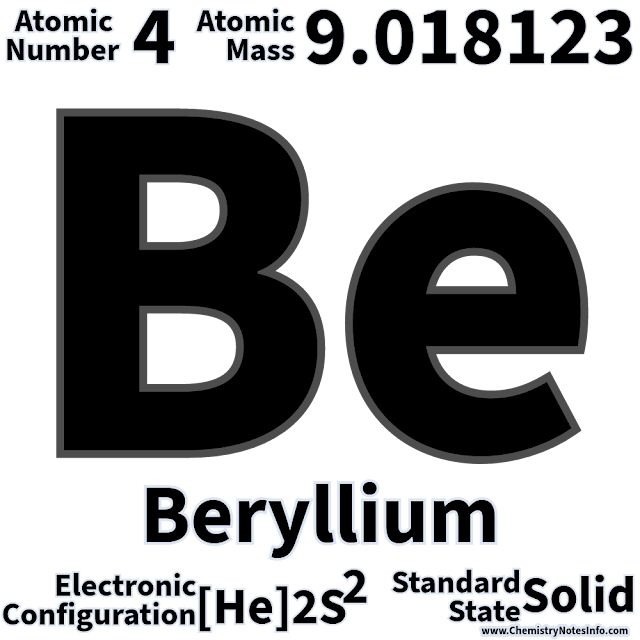Top 10 interesting facts about Beryllium
Beryllium is a relatively rare and unique element with interesting properties. Here are Top 10 interesting facts about Beryllium.
- Atomic Number 4: Beryllium has the atomic number '4' on the periodic table, and its chemical symbol is Be.
- Rare Element: Beryllium is a relatively rare element in the Earth's crust, making up just 0.0002% of its composition.
- Light but Strong: Beryllium is both lightweight and exceptionally strong, which makes Beryllium element very valuable in various applications, especially aerospace and defence.
- Low Density: It has a low density, only about a third that of aluminium, that's why it is used in lightweight structural materials.
- Toxic Dust: Beryllium dust or fumes are toxic and can cause a severe lung condition known as berylliosis. Special precautions are required when working with beryllium.
- High Melting Point: Beryllium has a high melting point of 1287°C (2349°F) and a boiling point of 2471°C (4480°F).
- Transparent to X-rays: Beryllium is transparent to X-rays, making it useful in X-ray windows, medical and industrial X-ray equipment, and in the construction of synchrotron radiation sources.
- Alloying Agent: Beryllium metal is often used as an alloying agent in materials like copper, resulting in beryllium-copper alloys known for their high electrical conductivity and resistance to corrosion.
- Neutron Moderator: In some nuclear reactors, beryllium is used as a neutron moderator to slow down neutrons and enhance nuclear reactions.
- Space Exploration: Beryllium is used in components of spacecraft, satellites, and telescopes due to its lightweight, strong, and stable properties, making it an ideal choice for use in space.
Beryllium element gets its name from the mineral beryl, which contains beryllium. Beryl is often used as a gemstone and includes varieties such as emerald and aquamarine.
Beryllium's unique combination of properties makes 'Be element' very useful in various technological and scientific applications, from aerospace to nuclear energy and X-ray technology.
Infographics on Interesting Facts about Beryllium
Physical and Chemical Properties of Beryllium
Given below are the physical and chemical properties of Beryllium element.
Property | Description |
Chemical Properties | Beryllium Chemical properties |
Chemical Symbol | Be |
Atomic Number | 4 |
Atomic Weight (amu) | 9.0122 |
Electron Configuration | [He] 2s2 |
Isotopes | Be-9, Be-10 |
Reactivity | Forms compounds readily, but it is not very reactive. |
Oxidation States | +2 |
Physical Properties | Beryllium Physical Properties |
State at Standard Conditions | Solid (metal) |
Melting Point | 1,287°C (2,349°F) |
Boiling Point | 2,471°C (4,480°F) |
Density (at 20°C) | 1.848 g/cm³ |
Molar Mass | 9.0122 g/mol |
Appearance | Silvery-white, relatively soft metal |
Solubility | Insoluble in water; reacts with acids. |
Electrical Conductivity | Good conductor of electricity |
Thermal Conductivity | High thermal conductivity |
Toxicity | Beryllium dust and fumes can be toxic and cause lung conditions. |
These properties highlight beryllium's characteristics as a lightweight, strong, but potentially toxic metal. Beryllium metal has many applications in various industries, including aerospace and nuclear technology.
If you like our science facts on Hydrogen Helium Lithium Beryllium, then share with your friends at WhatsApp Facebook and other social media platforms.
Fascinating Science Facts Book to Explore





.jpg)
%20(1).png)
